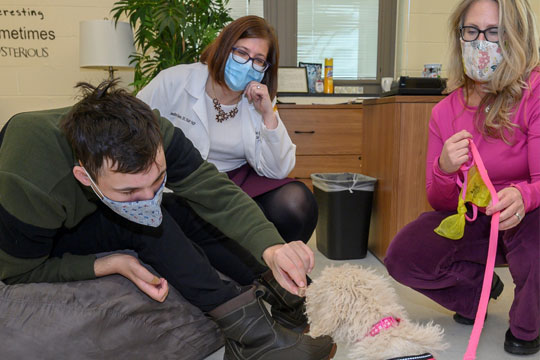South Jersey doctor empowers special needs patients

Dr. Andrea Iannuzzelli’s road to caring for patients with special needs began in her own home after her son, Nicholas, started experiencing seizures during his kindergarten year.
Nicholas was diagnosed with Lennox-Gastaut syndrome, a severe form of epilepsy that typically becomes apparent during infancy or early childhood.
Putting her bedside manners to the test, Dr. Iannuzzelli became more than a physician in the months that followed his diagnosis. Instead, she was a mother desperate to improve her son’s daily life.
"It seemed like we were losing ground, and, as a mom, I felt very disempowered because I’m a physician, and I couldn’t even take care of my child. I couldn’t even cure him,” said Dr. Iannuzzelli.
Eventually, Dr. Iannuzzelli’s son developed a brain tumor that amplified his symptoms and exacerbated concerns about his long-term treatment options.
Taking a hiatus from nephrology, her original focus, Dr. Iannuzzelli worked tirelessly to expand her medical skill set and find a holistic approach to her son’s individual needs after his diagnoses were made.
“I sought out some integrative medicine training to make sure there wasn’t any stone left unturned. I was then able to incorporate that skill set into my medical practice and the care of my son,” said Dr. Iannuzzelli.
Expanding practice with new patients
One of the lessons Dr. Iannuzzelli learned was that the most critical medication we can give ourselves is that which we put on the ends of our forks.
“My son’s been on the ketogenic diet to help manage his seizures, and that’s been effective for him. It was a game changer, and it was the first time I realized maybe there’s something besides what we learned in medical school, something besides prescribing medications,” said Dr. Iannuzzelli.
Her care expanded to include integrative practices like essential oils, energy healing through Reiki, and physical fitness with yoga.
Now, Dr. Iannuzzelli is funneling her knowledge into southern New Jersey’s first primary care and behavioral health care center for individuals with intellectual and developmental disabilities and their families at Rowan Integrated Special Needs Center (RISN).
Staffed with physicians, a psychologist, a psychiatric nurse practitioner, social workers, and caring assistants, Rowan Medicine’s new Sewell facility serves adults and adolescents ages 14 and up, drawing patients from New Jersey, Pennsylvania, and Delaware.
“We see such a diverse array of medical complexities and we pride ourselves on being able to tailor care to the individual,” said Dr. Iannuzzelli. “We try to think outside the box and meet our patients and their families in their comfort zones.”
The fully accessible center focuses primarily on the most vulnerable patients — individuals with autism, brain injuries, Down syndrome, intellectual disabilities, cerebral palsy, and other complex conditions originating in childhood, and focuses on care through adulthood.
The practice also cares for the caregivers, who often neglect their health needs to concentrate on their loved ones.
Feeling safe through specialized care
Historically, people with intellectual and developmental disabilities have poorer health, shorter life spans, and less access to high-quality medical care. Children with disabilities transitioning into adulthood often encounter significant barriers to adequate medical care, and few primary care practices are fully accessible or adequately equipped to treat them.
RISN minimizes barriers to entry with features like an exam room with a ceiling lift to safely weigh and transfer patients who use wheelchairs. In addition, the office has spacious hallways and rooms wide enough to navigate easily. One restroom even features a fold-down changing table, sized for most adults.
The institute also offers patients access to primary medical care like routine cancer screenings and bloodwork. Often, patients with intellectual and developmental disabilities are at an increased risk of developing common conditions like diabetes, hypertension, and cardiovascular disease.
Specific treatments and injections can feel threatening to some patients, so RISN prioritizes creating comprehensive medical plans that reduce fear while cultivating safe spaces for patients to ease their anxieties.
“It can be scary to have blood drawn or to receive a vaccination when people don’t have the verbal skills to be able to talk about their fears and voice needle phobia,” said Dr. Iannuzzelli. “We can guide patients through overwhelming processes in our desensitization room, which has beanbag chairs and lava lamps to calm their nerves.”
Increasing sexual health awareness
Last June, the center received a $100,000 grant to increase education and access to gynecological care and screenings for cervical and breast cancer, sexually transmitted infections, and pregnancy.
Women with intellectual and developmental disabilities (IDD) often go without sexual and reproductive health, but still must be informed for their safety.
“It’s difficult in the special needs population to talk about sexual health. Many don’t understand what sexual health means — and not just for women, but people of all genders,” said Dr. Iannuzzelli.
The hope is to elevate the standard of female health care among patients with IDD, remove barriers and address the disparities in education on sexual abuse and consensual sexuality.
The future of treating an underserved population
RISN Center aspires to be an evidence-based model of comprehensive care that leads to better outcomes and reduced health care costs. It’s also a training ground for medical students and residents, giving them an experience they can carry throughout their careers.
Medical students from Rowan University School of Osteopathic Medicine shadow RISN staff to learn more about this underserved population and become adept at caring for special needs individuals.
“Our goal is not only to treat the current population
